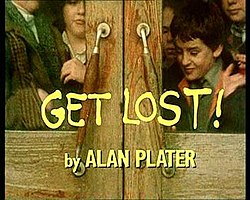Get Lost!
| Get Lost! | |
|---|---|
 |
|
| Genre | Comedy drama |
| Written by | Alan Plater |
| Starring |
Alun Armstrong Bridget Turner Michael Goldie Sheila Reid David Calder Brian Southwood |
| Theme music composer | Duke Ellington |
| Opening theme | "Dual Highway" |
| Ending theme | "Dual Highway" |
| Country of origin | UK |
| Original language(s) | English |
| No. of series | 1 |
| No. of episodes | 4 |
| Production | |
| Executive producer(s) | David Cunliffe |
| Producer(s) | Michael Glynn |
| Running time | c. 50 minutes per episode |
| Release | |
| Original network | ITV (Yorkshire Television) |
| Picture format | PAL 576i |
| Audio format | Monaural |
| Original release | 12 June – 3 July 1981 |
| Chronology | |
| Related shows | The Beiderbecke Trilogy |
Get Lost! is a British television drama serial made by Yorkshire Television in 1981 for the ITV network. Written by Alan Plater, the plot concerns the disappearance of the husband of Leeds schoolteacher Judy Threadgold (Bridget Turner). Investigating the disappearance, with the aid of her colleague, woodwork teacher Neville Keaton (Alun Armstrong), Judy learns of the existence of a secret organisation that helps disaffected people leave their unhappy lives behind.
Alan Plater's The Beiderbecke Affair (1985) started out as a sequel to Get Lost! but was rewritten with new characters when Alun Armstrong proved unavailable to reprise the role of Neville Keaton.
The plot of Get Lost! concerns the disappearance of Jim Threadgold (Brian Southwood), husband of English teacher Judy Threadgold (Turner). Aided by her colleague, woodwork teacher Neville Keaton (Armstrong), Judy sets out to find out what has happened to her husband. Judy and Neville soon discover the existence of a secret organisation dedicated to assisting people who want to escape the mundanity of their lives and families and just disappear. Although Judy eventually finds her missing husband, she is none too enthusiastic about taking him back and allows him to seek a new life running a fish and chip shop. Her adversarial relationship with Neville blossoms into a love affair.
Alan Plater had begun writing for television in the early 1960s and had been a regular writer on the police series Z-Cars (1962–78) and its spin-off series Softly, Softly (1966–69) and Softly, Softly: Taskforce (1969–76). He had also written several plays for the BBC and ITV and created and wrote the sitcom Oh No, It's Selwyn Froggitt! (1974). Plater's scripts were noted for their strong depiction of the lives of the inhabitants of Northern England. In 1978, Plater was commissioned by David Cunliffe, an executive producer at Yorkshire Television (YTV), to adapt J. B. Priestley's The Good Companions as a thirteen part serial. Plater was only able to stretch the plot to fill nine episodes and so offered to write four episodes of what he called a "non-violent thriller" to make up the balance.
...
Wikipedia
